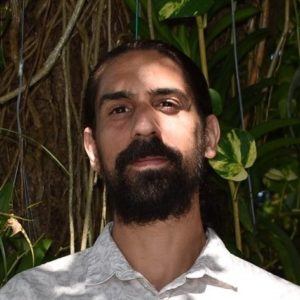
The language of mysticism has rooted itself within psychedelic literature from early on, and many researchers continue to associate or describe psychedelic experiences as having the qualities of mystical experiences.1–6 For psychedelic researchers who embrace the association between mystical and psychedelic experiences, the majority of which have worked with psilocybin, there is an indebtedness to the typologies of mysticism developed by William James, Walter Terence Stace, and Walter N. Pahnke.7–9 The ideas put forth by these thinkers have been incorporated into analytical frameworks such as the Hood Mysticism Scale (HMS) and the Mystical Experience Questionnaire (MEQ/MEQ-30) as a means of quantifying the phenomenology of psychedelic experiences.10–12
As one might expect, the use of mystical language within psychedelic science has drawn criticism for a number of reasons, as has the nature of subjectivity in general. The psychedelic experience itself, therefore, has been problematized with regards to its role in producing therapeutic effects either during or after a psychedelic experience. These concerns have been captured in a recent PSR article that summarizes one of the current debates within the psychedelic science community, highlighting two opposing perspectives on whether the subjective effects of psychedelics are needed to produce their therapeutic effects. What is essentially at stake in this debate is that on one hand, there is the argument that psychedelics predominantly produce their beneficial effects due to their psychoplastogenic nature.13,14 On the other hand, there is the idea that the mystical-type experiences that psychedelics can facilitate are significant to how psychedelics produce the full range of their enduring therapeutic effects.15
This article picks up on where the previous discussion left off, providing three new perspectives on the mysticism debate within psychedelic science. As we shall see, whereas some researchers wish to do away with mysticism due to methodological, ethical, and epistemological concerns, others embrace the scientific investigation of mystical experiences and find ways of reconciling mysticism with science through the adoption of alternative philosophical systems.
Demystifying Psychedelic Science
In a recent opinion piece, researchers James W. Sanders and Josjan Zijlmans argue that scientists should move away from investigating mysticism within psychedelic science.16 Their argument begins with the claim that the subject of mysticism is inherently unscientific due to its blurring of secular and supernatural concepts, phenomena, and language. There is a danger when using mysticism as a way of analyzing psychedelic experiences, according to Sanders and Zijlmans, insofar as it ‘black boxes’ certain phenomena as being beyond the scope of scientific investigation. This problem is related to the notion of ‘psychedelic exceptionalism’ which assumes that standard or well-established scientific procedures and protocols need not be followed when working with psychedelics since they are a unique class of drugs.17
One of the more salient critiques developed by Sanders and Zijlmans is that there is a risk of biasing data when participants are given concepts and frameworks through which to make meaning of their psychedelic experiences. This methodological critique may lead not only to misinterpretation on the part of participants, but also misrepresentation by researchers given their use of mystical terminology. In terms of ethics, Sanders and Zijlmans further warn that integrating mysticism into clinical research and practice can be both problematic and unrealistic when working with vulnerable populations.
What Sanders and Zijlmans advocate for is embracing secular understandings of spirituality and relying on cognitive neuroscientific models to better understand the phenomena currently associated with mysticism. Modern methodologies, such as the computational framework of predictive processing, are thereby viewed as holding promise in advancing our understanding of the subjective dimensions of psychedelic experiences. On this view, what is needed is a theoretical shift within psychedelic science that clarifies the distinction between nonempirical beliefs and scientifically observable phenomena. Otherwise, researchers run the risk of damaging both the potential and the credibility of psychedelic science.
A Defense of Mystical Experiences and ‘Weird’ Phenomena
In direct response to Sanders and Zijlmans, researchers Joost J. Breeksema and Michiel Van Elk argue that researchers should embrace the study of mystical experiences and other weird phenomena given that the desire to abolish mysticism from psychedelic science is erroneous for at least three reasons.18
The first is that since Sanders and Zijlmans are working with limited understanding of mystical experiences, they neglect the ways in which mystical experiences have been scientifically validated and rigorously investigated as a legitimate dimension of human experience. This leads to the second critique which holds that Sanders and Zijlmans also fail to acknowledge the scientific and clinical implications of mystical experiences that have been demonstrated over time. Third, Breeksema and Van Elk charge Sanders and Zijlmans with disregarding the value of the methodological tools that have been developed to study mystical experiences.
Instead, Breeksema and Van Elk suggest that the scientific study of mystical and other types of ‘weird’ experiences should be fully embraced within the psychedelic research community. Although the neuroscientific approach to mystical experiences provides unique and useful insights into the dimensions of psychedelic experiences, these should only be considered as one of many overlapping approaches to these types of phenomena. To eliminate the language of mysticism or the frameworks associated with mystical experiences altogether due to the difficulties involved in reconciling them with neuroscientific explanations would be unscientific. Ultimately, Breeksema and Van Elk maintain that researchers should respect the fact that the content of psychedelic experiences is significant and real for those who experience them, and further, that researchers should remain open to investigating all kinds of psychedelic experiences.
Reconciling Psychedelic Science with Mystical Experiences
Coming at the debate from a philosophical perspective, psychologist and philosopher Jussi Jylkkä agrees with Sanders’ and Zijlmans’ concerns regarding the methodological and ethical issues surrounding mystical experiences and their associated analytical frameworks.19 Jylkkä recognizes that apart from biasing the set and setting, there is also a risk of not allowing participants to make meaning on their own terms by interfering with their ability to autonomously interpret their experiences.
Despite these points of concession, Jylkkä argues that mystical phenomena need not be seen as being irreconcilable with science or naturalism. Jylkkä reminds us that at the heart of the matter, there is an ‘epistemic gap’ that separates subjective from objective phenomena, which harkens back to longstanding debates on the nature of consciousness within the philosophy of mind. For Jylkkä, not only do subjective and objective phenomena constitute two irreducible domains of experience, but the metaphysical insights and philosophical intuitions that are so often mentioned in psychedelic experience reports should not be psychologized or reduced to neuroscientific models. The noetic quality of psychedelic experiences for example, which may include radically new philosophical insights, can lead to significant shifts in the subject’s worldview that cannot be reduced to neuropsychological processes.
This leads to Jylkkä’s ethical stance on how researchers should approach the study of the subjective dimensions of psychedelic experiences. Granted that scientific models of consciousness can and should be produced, researchers should not conflate the models with reality, nor should they take a stance on the veridicality of the subject’s experience. The subjective dimension of psychedelic experiences, including those labeled mystical, should also not be seen as being at odds with the development of psychometric instruments.
One way of potentially reconciling these issues, according to Jylkkä, is by adopting a panpsychist philosophical disposition that can be formulated in a way that is compatible with both science and naturalism. What is key here is that panpsychism views consciousness as a fundamental aspect of the nature of reality, as opposed to those forms of materialism which posit that consciousness is nothing but the byproduct of a certain level of biological complexity. For Jylkkä, panpsychism can potentially go a long way in resolving the rift that exists between mysticism and subjectivity, and science and naturalism.
Conclusions
The nature of mystical experiences and subjectivity itself continues to be a contentious topic within psychedelic science. Whereas previous debates have highlighted whether the subjective dimensions of psychedelic experiences are required for their therapeutic effects, more recent perspectives offer nuanced considerations of both the nature of mystical experience and subjectivity in general.
The new perspectives reviewed in this article show that there are legitimate epistemological, ethical, and methodological concerns with investigating mysticism within psychedelic science. These include issues related to biasing data, denying research subjects the ability to autonomously interpret their experiences and ‘black boxing’ certain phenomena as beyond the scope of the investigation.
In contrast, other researchers have argued in favor of embracing mysticism within psychedelic science based on the idea that mystical experiences are a valid domain of human experience, in addition to there being an established body of scientific knowledge that has been amassed on the subject.
Further arguments in favor of reconciling mysticism with psychedelic science hold that the subjective dimensions of psychedelic experiences are irreducible to the objective observations made by scientists. On these grounds, not only is the content of a psychedelic experience irreducible to a neuroscientific model, but researchers should avoid taking a stance on the veracity of participants’ experiences as they tend to have momentous and lasting influences on a person’s fundamental worldview and beliefs.

Speaking of Bias… What Sanders and Zijlmans advocate for is embracing secular understandings of spirituality and relying on cognitive neuroscientific models to better understand the phenomena currently associated with mysticism. This arrogantly assumes these cognitive neuroscientific models are correct explanations of Consciousness and experience. “it’s my scientific sandbox and you will play by my rules!” Bernardo Kastrup, is nice and “secular,” and Ramana Maharshi’ has some “insights” into the nature of Consciousness as well. That “oneness” (the mystical), is no other than Consciousness, but academia is 100’s of years from that realization. What? You think that “normal problem solving” mentation… Read more »
Hogwash. I have been taking enormous doses of psychedelic drugs for 55 years and you can test-tube this stuff to your death and you will completely miss what they really do if you reduce these remarkable substances to “just a drug”. At least that’s the way I feel at 73 y/o. 41 years ago I took a large dose of mushrooms at Bryce Canyon. Hebrew letters started coming out of the rocks. I didn’t know Jews from Jamba juice at the time but they sure looked like Hebrew letters I saw over the years. After I got back home I… Read more »